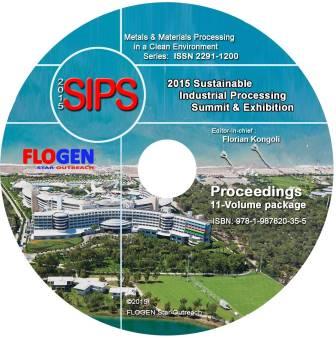2015-Sustainable Industrial Processing Summit
SIPS 2015 Volume 7: Ionic Liquids & Energy Production
| Editors: | Kongoli F, Gaune-Escard M, Mauntz M, Rubinstein J, Dodds H.L. |
| Publisher: | Flogen Star OUTREACH |
| Publication date: | 23 December 2015 |
| Pages: | 310 pages |
| ISBN: | 978-1-987820-30-0 |
| ISSN: | 2291-1227 (Metals and Materials Processing in a Clean Environment Series) |

< CD shopping page
Development of Briquettes with Alternative Carbonaceous Materials to Use in Ironmaking
Mauricio Bagatini1; Gustavo Irrthum1;1FEDERAL UNIVERSITY OF MINAS GERAIS, Belo Horizonte, Brazil;
Type of Paper: Regular
Id Paper: 219
Topic: 17
Abstract:
The ironmaking and steelmaking industry are responsible for a significant amount of energy consumed in Brazil, where the reduction of iron ore is the step that has the biggest consumes. The coal used in Brazil, which is the main source of energy of this sector, is 100% imported. In this context, the use of alternative carbon sources in consolidated processes and in the new routes in development that do not depend on coke to the iron production, has been the focus of several studies. This study aimed to develop briquettes from alternative carbonaceous materials to use in ironmaking processes. The briquettes were produced with Brazilian coal, charcoal fines and petroleum coke, and with the following binders: lime and molasses, olivine and Portland cement. These briquettes were obtained with a hydraulic press and submitted to the reactivity and mechanical strength tests. The reactivity was evaluated by mass variation when the briquettes were submitted to the high temperatures until (1200 °C) in CO2 atmosphere conditions. The mechanical strength tests were carried out before and after the reactivity test, through the compressive strength and drum. To verify the responsible phenomena for the differences of reactivity and mechanical strength between the briquettes, the physical and chemical characterization and microstructural analysis of the samples were carried out. From the results obtained, it was possible to indicate the performance of briquettes produced with different combinations of carbonaceous materials and binders.